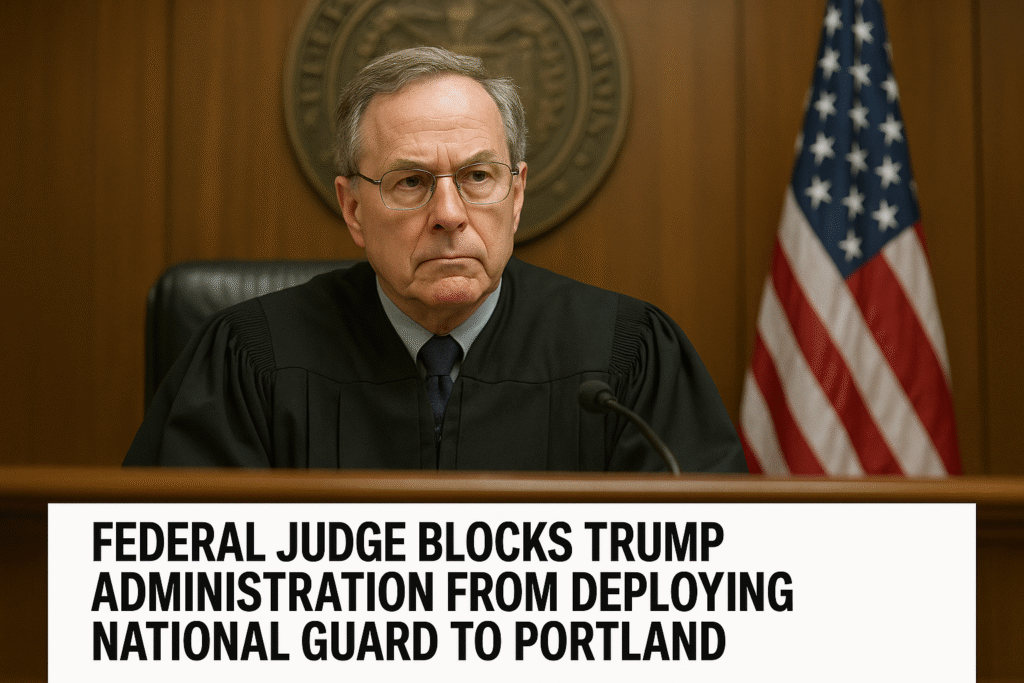By Harshit | October 5, 2025 | Portland, Oregon
A federal judge in Oregon has temporarily blocked the Trump administration from deploying the National Guard into Portland, issuing a restraining order after President Donald Trump announced plans to send troops to what he described as a “war-ravaged” city.
The ruling, handed down by Trump-nominated District Judge Karin Immergut, marks the latest judicial check on the administration’s efforts to intervene in Democratic-led cities under the pretext of curbing crime and protecting federal facilities.
Judge Immergut found that Oregon and the city of Portland “are likely to succeed on their claim that the President exceeded his constitutional authority and violated the Tenth Amendment.” She argued that while recent clashes between protesters and federal officers were “inexcusable,” they did not rise to the level of incidents requiring military intervention.
“The administration made a range of arguments that, if accepted, risk blurring the line between civil and military federal power—to the detriment of this nation,” Immergut wrote in her opinion.
Temporary Restraining Order and Next Steps
The restraining order expires on October 18, giving the state the opportunity to request an extension. Oregon Attorney General Dan Rayfield confirmed the state’s intention to pursue a continuation of the order. Meanwhile, the Trump administration plans to appeal the decision to the Ninth Circuit Court of Appeals.
Under the court’s order, the National Guard remains under the command of Oregon Governor Tina Kotek. Rayfield emphasized that the ruling reaffirmed that there was no widespread rebellion or major disruption in Portland prior to the administration’s directive.
“Today’s ruling is a healthy check on the president’s power,” Rayfield said at a news conference. “As the president, you must have actual facts based on reality, not social media or just your gut feeling, if you want to mobilize the military.”
Governor Kotek described the decision as “a step in the right direction,” urging the administration to respect the court’s ruling.
Background: Protests and Federal Response
The Trump administration cited renewed unrest in Portland and Chicago as justification for deploying federal troops. In Portland, demonstrations outside a U.S. Immigration and Customs Enforcement (ICE) facility have prompted a focus on what officials describe as violent activity by “Antifa domestic terrorists.” Local authorities dispute this characterization, noting that the protests were small and largely peaceful until federal intervention was announced.
In Chicago, the administration has authorized 300 members of the Illinois National Guard to “protect federal officers and assets” following protests at an ICE facility that led to multiple arrests.
Federal agents, including personnel from the Department of Homeland Security and the Border Patrol, have been deployed to both cities to monitor demonstrations and protect federal property.
Local Officials Push Back
Portland Mayor Keith Wilson criticized the president’s description of the city, calling it “wildly hyperbolic.” He stated at a Saturday news conference, “I’ve said from the very beginning the number of federal troops that are needed or wanted is zero.”
Oregon and Portland officials jointly filed suit earlier this week, arguing that the deployment violates constitutional limits and the Tenth Amendment, which reserves powers to the states. Their lawsuit asserts that the president’s claims about Portland’s security situation misrepresent reality and exaggerate the level of unrest.
The case highlights ongoing tensions between the federal government and Democratic-led cities, where officials have repeatedly pushed back against what they see as federal overreach.
Implications
The restraining order represents a temporary victory for local authorities seeking to maintain control over their law enforcement and the deployment of military forces within their jurisdiction. It also underscores the legal and constitutional challenges the Trump administration faces in its attempts to deploy the National Guard to cities led by opposing political parties.
As the administration prepares to appeal, attention will focus on whether federal forces can be mobilized despite local opposition, and whether courts will continue to limit the president’s authority in domestic deployments.
For now, Portland remains under the command of state authorities, with federal troops barred from intervening in the city, while local officials monitor demonstrations and maintain civil order

